English
11.02.2024

DAYTON AGREEMENT AND RESOLUTION 2625
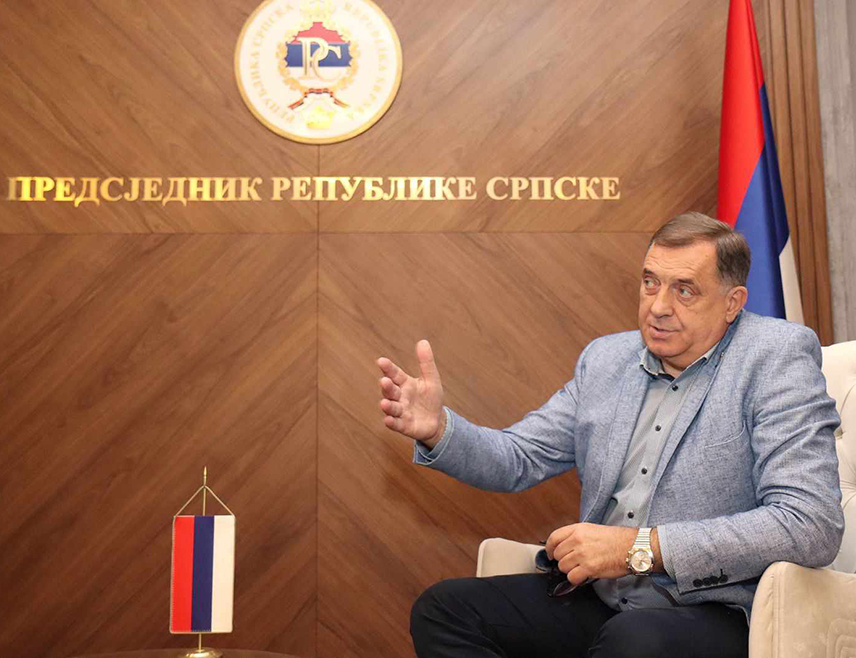
BANJALUKA, FEBRUARY 11 /SRNA/ - All peoples have the right to determine their political status, completely free and without foreign interference, and to continue their economic, social and cultural development, and each state is obliged to respect this right in accordance with the provisions of the UN Charter, Republika Srpska President Milorad Dodik pointed out.
SRNA publishes the column by Republika Srpska President Milorad Dodik in its entirety: The Dayton Accords or the General Framework Agreement for Peace in BiH, which is its official name, is one of the most important international law documents created after World War II. In addition to this general and framework agreement, it contains 11 annexes by which the signatories - Republika Srpska and the Federation of BiH, have agreed and detailed the conditions for achieving a peaceful solution after the civil war in BiH. As such, the Dayton Agreement is a treaty to which the Vienna Convention on the Law of Treaties refers, as defined by the Venice Commission of the Council of Europe and the Constitutional Court of BiH. Certainly the most important is Annex 4 called "the Constitution of BiH" which established the constitutional legal structure of the state union by which Republika Srpska and the Federation of BiH formed the post-war "Bosnia and Herzegovina," without any determinants of its state designation and organization. Therefore, the Dayton BiH is neither a republic, nor a federation /which it cannot be because it already has a federation in its composition/, nor a federal state, nor anything else that exists in constitutional legal practice. It is closest to the confederation, given the very small number of exactly enumerated state powers that the two entities have transferred to the level of "Bosnia and Herzegovina." They thus have the status of state-building entities but have retained the vast majority of state powers, all those that are not explicitly designated by the Constitution of BiH as powers of “Bosnia and Herzegovina.” This constitutional construction under Article 3.3.a) of the Constitution of BiH is very similar to the construction of the union of states that make up the United States of America, as it is written in amendment 10 of the US Constitution: "Powers not delegated by the Constitution to the United States, nor prohibited by it to the States, are reserved to the states respectively or to the people." INTERNATIONAL LAW – FOUNDATION OF BiH The emergence and construction of post-war "Bosnia and Herzegovina" is based on international law. It was created at the International Peace Conference in Dayton in 1995, on November 21, when the peace treaty was initialed, and on December 14 of the same year, it was officially signed in Paris. The foundation was, as Annex 4 - the BiH Constitution says, as follows: "Guided by the purposes and principles of the Charter of the United Nations, committed to the sovereignty, territorial integrity and political independence of Bosnia and Herzegovina in accordance with international law, determined to ensure full respect for international humanitarian law, inspired by the Universal Declaration of Human Rights, International Covenants on Civil and Political Rights, and on Economic, Social and Cultural Rights, and the Declaration on the Rights of Persons Belonging to National or Ethnic, Religious and Linguistic Minority as well as other human rights instruments.” Given that the Charter of the United Nations is the most important act of international law, one should start off from its official, authentic interpretation established by the United Nations General Assembly at its 25th session held on October 24, 1970, when it passed Resolution 2625, the result of which is the "Declaration of Principles of International Law on Friendly Relations and Cooperation of States in accordance with the Charter of the United Nations." This Declaration is accepted by international judicial bodies as an authentic interpretation of the UN Charter. The CHARTER of the UN regulates the principles of international law which are binding on a contractual basis by all members of the UN and are considered to be rules of international law of a general nature. Given that the UN Charter and the two international Covenants on Civil and Political Economic, Social and Cultural Rights are an integral part of the Dayton Agreement and its Constitution of BiH, the Declaration is also a credible interpretation of them. Therefore, according to the Declaration, the principles of international law of a general nature are undoubtedly understood: the principle of prohibition of force; the principle of peaceful settlement of international disputes; the principle of non-intervention; the duty of states to cooperate with each other in accordance with the UN Charter; the principle of equality and self-determination of peoples; the principle of sovereign equality of states and the principle of fulfilling accepted international obligations in good faith. We will cite the most important parts of this Declaration: The preamble to the 1970 Declaration says, among other things: "Convinced that the subjection of peoples to alien subjugation, domination and exploitation constitutes a major obstacle to the promotion of international peace and security, convinced that the principle of equal rights and self-determination of peoples constitutes a significant contribution to contemporary international law, and that its effective application is of paramount importance for the promotion of friendly relations among states, based on respect for the principle of sovereign equality,” introducing seven principles of relations among states and peoples. Principle No. 1: The Declaration obliges states to “refrain in their international relations from the threat or use of force against the territorial integrity or political independence of any state, or in any other manner inconsistent with the purposes of the United Nations.” Principle No. 3 confirms “the duty not to intervene in matters within the domestic jurisdiction of any State, in accordance with the UN Charter. Principle No. 5 - The principle of equal rights and self-determination of peoples. Principle No. 6 - The principle of sovereign equality of states. The Charter of the United Nations does not divide nations into small and large or states into small and large. Equality and respect for the sovereignty of every state are general principles of international law. When it comes to the principle of non-intervention in affairs that fall under the internal jurisdiction of the state, the Declaration says: "No state /USA, Great Britain, Germany.../ or group of states /PIC and its Steering Board as a self-appointed and self-elected body of self-elected countries without a basis in the Dayton Agreement/ has the right to intervene, directly or indirectly /individual Western ambassadors in Sarajevo, high representative and the OHR, foreign judges in the Constitutional Court of Bosnia and Herzegovina, the Prosecutor's Office and the Court of Bosnia and Herzegovina as extraconstitutional judiciary, according to the Muslim occupation rule - the qadi sues you, the qadi judges you/, for any reason /due to the legitimate demands of Republika Srpska for consistent compliance with the Dayton Agreement as it was signed; due to disrespect for the illegal and illegitimate /high representative/ Christian Schmidt and his terrorist decisions; due to calls for independence of Republika Srpska due to violations of the Dayton Agreement by foreign countries and their representatives , both ordinary ones - Murphy and special ones - Escobar, O'Brien, Peach, Sarrazin; due to the constant outvoting of Serbian judges in the Constitutional Court of Bosnia and Herzegovina; due to selective justice in trials for war crimes and the release of Muslim commanders - Naser Orić and others; due to the persecution of almost all members of the Republika Srpska Army, accusations of "genocide", etc., etc./ in the internal or external affairs of another country /the relations between Republika Srpska as an internationally recognized entity and other countries - Serbia, Russia, Hungary, China and others/. Therefore, not only armed intervention, but also any other form of interference or any other threat, directed against state officials /sanctions against Dodik, Cvijanović, Stevandić, Višković and others; staged trials based on laws imposed by Petritsch, Asdhdown, Incko, and especially Christian Schmidt/ or against state political, economic and cultural elements /crashing the websites of Republika Srpska bodies, stopping projects and funds based on already fulfilled reforms and goals of the European Union/, are contrary to international law. No country can apply or support the use of measures of economic, political or any other nature in order to force another state /Republika Srpska and its democratically elected government bodies/ to submit to it in the exercise of its sovereign rights /powers that belong to Srpska according to the Constitution of BiH and the Constitution of Republika Srpska, which is harmonized with the Constitution of BiH/ or to receive benefits of any kind from it /exploitation of agricultural, forest, water, mineral and other resources, which would follow after the confiscation of property according to Schmidt’s "law" and decisions of unconstitutional institutions at the level of BiH – the BiH Concessions Commission/. The use of force /threat of persecution - lawsuits and imprisonment/ in order to deprive the people of their national identity /ban on January 9 as Republic Day, the anthem "God's Justice" and the coat of arms of Republika Srpska/ represents a violation of their inalienable rights and the principle of non-intervention. So, to reiterate, without insertions: "No state has the right to intervene, directly or indirectly for any reason in the internal or external affairs of another state. Therefore, not only armed intervention, but also any other form of interference or any other threat directed against a person, state or against its political, economic and cultural elements, are contrary to international law. No state may apply or support measures of an economic, political or any other nature to compel another state to submit to it in the exercise of its sovereign rights or to obtain benefits of any kind from it. Using force to deprive people of their national identity violates their inalienable rights and the principle of non-intervention". Principle number 5 from the Declaration of October 24, 1970 - on the equality and self-determination of peoples, is an elaboration of what is written in the UN Charter and international pacts that are an integral part of the Constitution of Bosnia and Herzegovina. It is written in the Declaration: "All PEOPLES have the right to determine their political status, completely free and without foreign interference, and to continue their economic, social and cultural development, and each state /"Bosnia and Herzegovina", Serbia, Croatia, USA, Russia, Germany, Britain, etc./ is obliged to respect this right in accordance with the provisions of the Charter. Bearing in mind that subjecting the PEOPLE to foreign subjugation /O'Brien, Christian Schmidt, Michael Murphy, Johann Sattler and other Sarajevo embassies/ to domination or exploitation, represents a violation of this principle, as well as a denial of basic human rights /trial based on the decisions imposed by foreigners, not according to the laws of BiH/ and it is in contradiction with the UN Charter. And let us reiterate once again: "All PEOPLES have the right to determine their political status, completely free and without foreign interference, and to continue their economic, social and cultural development, and every state is obliged to respect this right in accordance with the provisions of the Charter. Bearing in mind that subjecting PEOPLE to foreign subjugation, domination or exploitation is a violation of this principle, as well as a denial of basic human rights and is in contradiction with the UN Charter". When it comes to the self-determination of peoples, it is written in principle number 5: "The establishment of a sovereign and independent state, the free association or integration with an independent state or the emergence into any other political status freely determined by a people constitute modes of implementing the right of self-determination by that people." Every state has the duty to refrain from any forcible action that deprives peoples referred to above in the elaboration of the present principle of their right to self-determination and freedom and independence. In their actions against, and resistance to, such forcible action in pursuit of the exercise of their right to self-determination, such peoples are entitled to seek and to receive support in accordance with the purposes and principles of the Charter. DISINTEGRATION OF BiH ACCORDING TO MILAN KUČAN Since there was not enough readiness and determination to apply the constitutional system of Yugoslavia /Bosnia and Herzegovina/, then, of course, this in itself led to that logical disintegration which, in my opinion, was inevitable. I'm coming back to it again - the state unions created in some special historical conditions must be ready to reaffirm the reason for their joint existence at the moment when these historical conditions change. The processes had gone too far and alternatives were necessary. It was necessary to think about what if we no longer recognize that country /Bosnia and Herzegovina/ as ours, then what? I think it was logical that the alternative was an independent state.
English

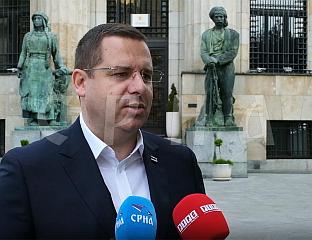
KOVAČEVIĆ IN WASHINGTON: SRPSKA HAS THOSE WHO WILL HEAR IT AND UNDERSTAND IT
WASHINGTON, MARCH 4 /SRNA/ - An important meeting with friends in Washington, said Radovan Kovačević, a Serb member of the House of Peoples of the Par...


MEETING IN WASHINGTON WITH REPRESENTATIVES OF INFLUENTIAL JEWISH ORGANIZATIONS
WASHINGTON, MARCH 4 /SRNA/ - The Serb member of the Presidency of BiH, Željka Cvijanović, met today in Washington with representatives of influential...


BASKETBALL CLUB JAHORINA WILL HOST TFT FROM SKOPLJE TOMORROW
PALE, MARCH 4 /SRNA/ - The Jahorina Basketball Club from Pale will host the team TFT from North Macedonia tomorrow in a regional round of the ABA 2 Le...

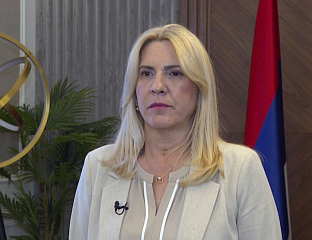
CVIJANOVIĆ SENDS LETTERS OF SUPPORT TO HEADS OF STATE OF UAE, BAHRAIN, QATAR, SAUDI ARABIA AND KUWAIT
ISTOČNO SARAJEVO, MARCH 4 /SRNA/ - The Serb member of the Presidency of BiH Željka Cvijanović sent letters to the heads of state of the United Arab Em...

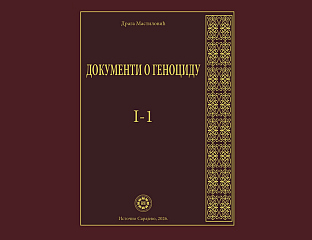
FIRST BOOK OF COLLECTION OF DOCUMENTS ON GENOCIDE AGAINST SERBS IN NDH PUBLISHED
ISTOČNO SARAJEVO, MARCH 4 /SRNA/ - The Institute of Historical Sciences of the University of Istočno Sarajevo has published the first book of the firs...

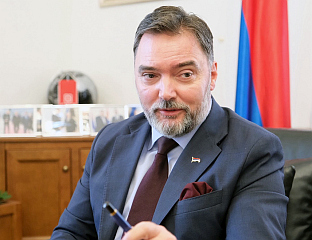
SERBIA REAFFIRMS RESPONSIBLE POLICY ARISING FROM ITS RELATIONS WITH SRPSKA
SARAJEVO, MARCH 4 /SRNA/ - Deputy Chairman of the Council of Ministers Staša Košarac said that the offer by the President of Serbia, Aleksandar Vučić,...





 LATEST NEWS:
LATEST NEWS: